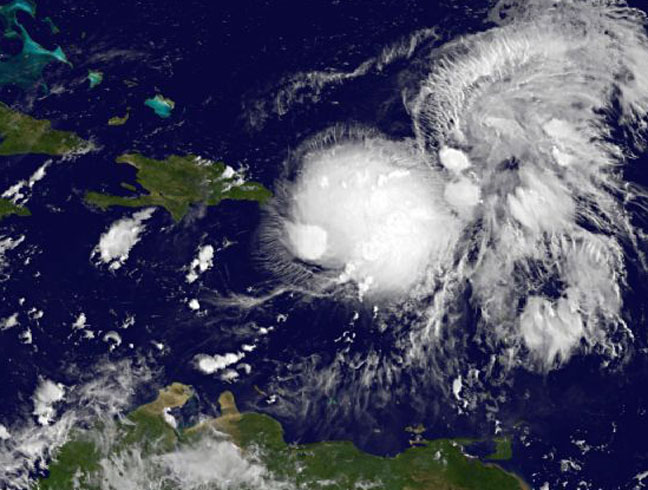
Lackluster Hurricane Season Could Still Rev Up

Get the world’s most fascinating discoveries delivered straight to your inbox.
You are now subscribed
Your newsletter sign-up was successful
Want to add more newsletters?

Delivered Daily
Daily Newsletter
Sign up for the latest discoveries, groundbreaking research and fascinating breakthroughs that impact you and the wider world direct to your inbox.

Once a week
Life's Little Mysteries
Feed your curiosity with an exclusive mystery every week, solved with science and delivered direct to your inbox before it's seen anywhere else.

Once a week
How It Works
Sign up to our free science & technology newsletter for your weekly fix of fascinating articles, quick quizzes, amazing images, and more

Delivered daily
Space.com Newsletter
Breaking space news, the latest updates on rocket launches, skywatching events and more!

Once a month
Watch This Space
Sign up to our monthly entertainment newsletter to keep up with all our coverage of the latest sci-fi and space movies, tv shows, games and books.

Once a week
Night Sky This Week
Discover this week's must-see night sky events, moon phases, and stunning astrophotos. Sign up for our skywatching newsletter and explore the universe with us!
Join the club
Get full access to premium articles, exclusive features and a growing list of member rewards.
Tropical Storm Gabrielle formed this morning (Sept. 5), but has already been downgraded to a tropical depression after a combination of data showed it had become disorganized and unable to sustain tropical storm-force winds. And it's expected to weaken further and sputter out, the National Oceanic and Atmospheric Administration (NOAA) reports.
Gabrielle is only the latest developing storm to weaken in an Atlantic hurricane season expected to be above average and possibly "extremely active" — in May, NOAA scientists said they expected to see 13 to 20 named storms, a designation that includes tropical storms and hurricanes.
But so far this year, there haven't been any hurricanes, and only seven named storms. As of this time last year, there had been 12 named storms, six of which were hurricanes, said Jeff Weber, a scientist with the University Corporation for Atmospheric Research in Boulder, Colo. [Image Gallery: Hurricane Season 2013]
So why haven't there been any hurricanes so far this season? And will the season rev up?
Blame it on the wind
The lack of hurricanes can be blamed on westerly winds, Weber said. So far this summer, there have been strong winds blowing from west to east across the Atlantic, which have systematically destroyed developing storms and prevented them from strengthening and growing into well-organized hurricanes, Weber said. Hurricanes are fueled by the transfer of heat from the ocean to the upper atmosphere, but they depend on a relatively symmetrical, rotating system to get going. They form best in calm conditions, with warm surface temperatures, Weber added.
A second, lesser factor: Dry air and dust have also been blowing westward from North Africa's Sahel region, hampering development of early season hurricanes that often form near the Cape Verde Islands in the eastern Atlantic, Weber said. These hurricanes form from thunderstorms on the African continent that blow out over the ocean. Thunderstorms basically consist of rising warm air, and are weakened by this easterly flow of dry air and dust, Weber said. While this was at play earlier in the year, it's not much of a factor now, he said.
Get the world’s most fascinating discoveries delivered straight to your inbox.
Other than that, the surface of the ocean is quite warm — about 2 to 3 degrees Fahrenheit (1 to 1.5 degrees Celsius) above average — conditions that favor hurricane formation, Weber said. "The energy is there in the Atlantic Basin; the ocean temperatures are ripe for development," he said. "But we don't have the upper atmospheric conditions to support hurricane formation."
Not 'out of the woods'
Thus, if the westerly winds die down a bit, the season could really ramp up. Although it doesn't look like that's going to happen in the next few days or this week, it could happen later this month, Weber said —and both primary cyclone forecasting groups at NOAA and Colorado State University expect that to happen, he added; NOAA still predicts that there will be 13 to 19 named storms, coming down slightly from the upper estimate of 20 issued in May.
"We're not out of the woods yet," Weber said.
But then again, the westerly winds could persist for some time, he added. The system is almost behaving as if El Niño conditions are in place, Weber said. El Niño is a climate pattern defined by warm surface temperatures in the eastern Pacific, with wide-ranging effects for the global climate. One result of El Niño is westerly winds, like those being observed now. The lack of El Niño conditions was one of the reasons the 2012 Atlantic hurricane season was so active.
Although El Niño is not currently in place, conditions may be headed in that direction, although the swing toward El Niño takes months rather than weeks, Weber said.
The latest date for a season's first hurricane, at least within the last 40 years when satellites have allowed for more accurate and comprehensive cyclone monitoring, is Sept. 11 (set by Hurricane Gustav in 2002). So 2013 could be one for the record books if this hurricane drought continues.
The hurricane season has been "highly unusual and could be record-breaking if we don't have one in the next six days," Weber noted. "That said, we're still expected to have a vigorous hurricane season."
Email Douglas Main or follow him on Twitter or Google+. Follow us @livescience, Facebook or Google+. Article originally on LiveScience.
 Live Science Plus
Live Science Plus











